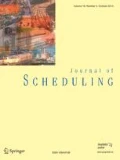Abstract
In this paper, we present a simple recursive equation and an iterative procedure to determine the best-case response times of periodic tasks under fixed-priority preemptive scheduling and arbitrary phasings. The approach is of a similar nature as the one used to determine worst-case response times (Joseph and Pandya, 1986) in the sense that where a critical instant is considered to determine the latter, we base our analysis on an optimal instant. Such an optimal instant occurs when all higher priority tasks have a simultaneous release that coincides with the completion of an execution of the task under consideration. The resulting recursive equation closely resembles the one for worst-case response times. The iterative procedure is illustrated by means of a small example. Next, we apply the best-case response times to analyze jitter in distributed multiprocessor systems. To this end, we discuss the effect of the best-case response times on completion jitter, as well as the effect of release jitter on the best-case response times. The newly derived best-case response times generally result in tighter bounds on jitter, in turn leading to tighter worst-case response time bounds.
Similar content being viewed by others
REFERENCES
Audsley, N. C., A. Burns, M. F. Richardson, K. Tindell, and A. J. Wellings, “Applying new scheduling theory to static priority pre-emptive scheduling,” Software Eng. J., 8, 284–292, (1993).
Audsley, N. C., A. Burns, M. F. Richardson, and A. J. Wellings, “Hard real-time scheduling: The deadline monotonic approach,” in Proceedings 8th IEEE Workshop on Real-Time Operating Systems and Software, 1991, pp. 133–137.
Bril, R. J., E. F. M. Steffens, and W. F. J. Verhaegh, “Best-case response times of real-time tasks,” in Proceedings Philips Workshop on Scheduling and Resource Management (SCHARM), pp. 19–27, June 2001. http://www. extra.research. philips.com/publ/nl-ms/r-20.914.pdf.
Joseph, M., (ed), Real-Time Systems: Specification, Verification and Analysis, Prentice Hall, 1996.
Joseph, M. and P. Pandya, “Finding response times in a real-time system,” Comput. J., 29, 390–395, (1986).
Kim, T., J. Lee, H. Shin, and N. Chang, “Best case response time analysis for improved schedulability analysis of distributed real-time tasks,” in Proceedings ICDCS Workshop on Distributed Real-Time Systems, 2000, pp. B14–B20.
Kim, T., H. Shin, and N. Chang, “A jitter analysis for improved schedulability of distributed real-time tasks”, J. KISS Comput. Syst. and Theory, 27, 506–517, (2000) (in Korean).
Klein, M. H., T. Ralya, B. Pollak, R. Obenza, and M. González Harbour, A Practitioner's Handbook for Real-Time Analysis: Guide to Rate Monotonic Analysis for Real-Time Systems, Kluwer Academic Publishers, 1993.
Liu, C. L. and J. W. Layland, “Scheduling algorithms for multiprogramming in a real-time environment,” J. ACM, 20, 46–61, (1973).
Palencia Gutiérrez, J. C., J. J. Gutiérrez García, and M. González Harbour, “Best-case analysis for improving the worst-case schedulability test for distributed hard real-time systems,” in Proceedings of the 10th EuroMicro Workshop on Real-Time Systems, 1998, pp. 35–44.
Tindell, K. W., A. Burns, and A. J. Wellings, “An extendible approach for analyzing fixed priority hard real-time tasks,” Real-Time Sys., 6, 133–151, (1994).
Author information
Authors and Affiliations
Rights and permissions
About this article
Cite this article
Bril, R.J., Steffens, E.F. & Verhaegh, W.F. Best-Case Response Times and Jitter Analysis of Real-Time Tasks. Journal of Scheduling 7, 133–147 (2004). https://doi.org/10.1023/B:JOSH.0000014069.63823.e7
Issue Date:
DOI: https://doi.org/10.1023/B:JOSH.0000014069.63823.e7




